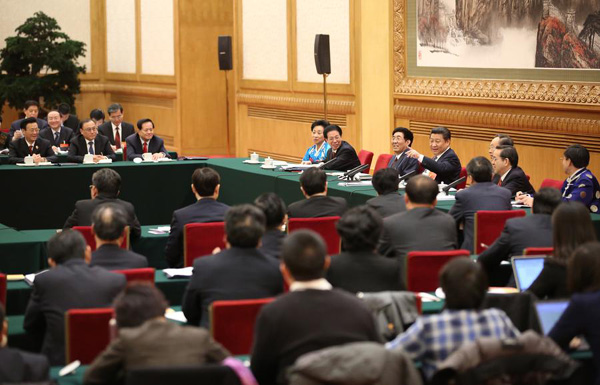 |
|
Chinese President Xi Jinping (back, 4th R), also general secretary of the Communist Party of China (CPC) Central Committee and chairman of the Central Military Commission, joins a panel discussion with deputies to the 12th National People's Congress (NPC) from northeast China's Jilin province during the third session of the 12th NPC, in Beijing, capital of China, March 9, 2015. [Photo/Xinhua] |
The first of the 'Four Comprehensives' Xi Jinping has put forward, that China should become a 'moderately prosperous society', is a step towards the Chinese president's definition of the country's final goal: 'the building of a moderately prosperous society in all respects by the centenary of the CPC in 2021, and building China into a modern socialist country… by the centenary of the PRC in 2049, so as to realize the Chinese Dream of the rejuvenation of the Chinese nation.'
But China contains almost one fifth of humanity. It cannot be an 'ordinary' country. Normal desires by China's people have extraordinary global consequences. Achieving a 'moderately prosperous society' necessarily transforms not only China but the world. Understanding this clarifies why the other three of Xi Jinping's 'four comprehensives' are required.
China's development since 1949 is the single greatest economic and social achievement in human history. That is directly measurable in the number of people, the proportion of the world's population, whose lives were improved.
Even before its 1978 economic reforms China had the world's greatest social achievement. The most sensitive indicator of overall social conditions is life expectancy. In 27 years between the establishment of the People's Republic of China and Mao Zedong's death in 1976, China's life expectancy increased by 31 years, or over a year per chronological year – the most rapid increase in a major country in history.
After 1978, China's economic growth is the most rapid ever in a major country, but still more significant is the number of people it affected. When the US began rapid economic growth, in the late 19th century, it contained 3 percent of the world's population. China in 1978 contained 22%. Never have the lives of such a large proportion of humanity been improved so rapidly as in China.
In 2015, by World Bank criteria, 18% of the world's population live in 'high income' economies – a level only slightly above China's definition of 'moderate prosperity,' and which China will achieve slightly after 2021. China is 19% of the world's population. China will more than double the number living in high income economies.
For humanity's general interests, China's success is the greatest possible reason to celebrate. Any objective approach would hail China's extraordinary achievements.
But for some people thinking not of humanity's general interests, but their own privileges, China becoming 'moderately prosperous' is their worst nightmare. US neo-cons in particular are not committed to equal 'win-win' relations between countries but to what they term 'US primacy'. To sustain this China's economy must remain smaller than the US. But as China's population is more than four times the US, this is a demand China should never achieve even one quarter of US living standards. China must never become 'moderately prosperous' but must be poor.
But to fulfil the 'moderately prosperous'goal is not a once-for-all progress; China will definitely face challenges both from home and abroad, especially from some people who don't think of humanity's general interests and commitment to equal 'win-win' relations between countries.
Notwithstanding, implementing the 'Four Comprehensives' will simultaneously move China towards 'moderate prosperity', while blocking activities aimed to prevent this.
The four comprehensives' emphasis on 'party discipline' blocks the possibility of the self-made collapse of the leading party. The four comprehensives 'rule of law' blocks arbitrary actions discrediting the Communist Party.
The third comprehensive's 'deepening reform' stresses, as Xi emphasized earlier this year, that people must directly 'feel' beneficial effects of reform.
Carrying out the 'Four Comprehensives' can ensure China achieves 'moderate prosperity.'
The author is a Senior Fellow at Chongyang Institute for Financial Studies, Renmin University of China.